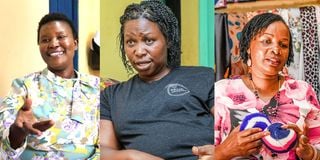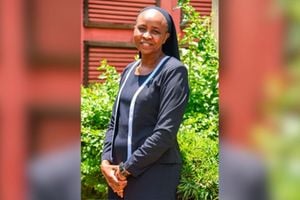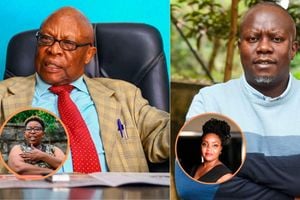
From Left: Jeniphar Chelimo, Lucy Njeri and Mary Mwangi. They are all breast cancer survivors.
Being a parent is challenging enough, but facing a life-threatening illness while raising children creates a test of unimaginable proportions. For many mothers, breast cancer is not just a medical diagnosis but also a seismic shift in their roles as caregivers and providers. Three women; Jeniphar Chelimo, Lucy Njeri, and Mary Mwangi share stories of their fight with breast cancer and navigating the duties of motherhood.
Cancer took my strength but not my hope
Jeniphar Chelimo, a 39-year-old mother and former salonist, describes 2023 as the hardest year of her life. It was the year she received her breast cancer diagnosis, fought the fear of death, and grappled with the thought that she might not live to raise her children.
Her ordeal began with what seemed like an innocent symptom: nipple sensitivity. "I used to experience it during my periods, but one time, the sensitivity persisted even after my menstruation ended," she recalls. Concerned, she sought advice from a friend, who urged her to see a doctor, suspecting it might be breast cancer.
At first, the doctors brushed off her concerns, attributing her symptoms to hormonal imbalance. Determined to find answers, Jennifer sought help from Kenyatta National Hospital, where a biopsy confirmed her worst fear; Stage 3C breast cancer.
"The diagnosis hit me like a ton of bricks. I couldn’t hear or talk. I just sat there in the doctor’s office for hours, numb with shock. I would see people moving but I didn’t understand what they were saying. I remember thinking, 'How will I take care of my children?' I even contemplated suicide," Jeniphar admits adding, “I started thinking about how I would take my children to their father, who abandoned them then go get hit by a car and leave behind a suicide note. I just wanted to die because I knew that I did not have the money for the treatment.”

Jeniphar Jelimo during an interview at her home in Kangemi, Nairobi on October 9, 2024.
It took the intervention of a social worker, who shared inspiring stories of cancer survivors, to reignite her will to live. She went through eight rounds of chemotherapy, 15 sessions of radiotherapy, and a mastectomy. She says that the National Health Insurance Fund catered for half her treatment costs and she had to raise the rest. Now in remission and on hormonal therapy, Jennifer is adjusting to a new normal, one marked by physical limitations.
“Before cancer, I was always there for my children; helping with homework and cooking meals. Now I cannot cook or wash dishes because my hands are weak. I’ve had to rely on my 18-year-old niece to help out,” the mother of three shares.
Upon getting her diagnosis, Jeniphar’s first instinct was to send her two nieces and her eldest daughter home to their grandparents as she worried she may not be able to care for them. “I was left with my son and daughter who were 11 years and six years respectively at the time. Alone and with two young children, I had to prepare food for them. The only meal we could take was rice or githeri (a mixture of beans and maize) because I didn’t have the strength to cook ugali. I was alone until a friend came and advised me to seek help. So I called back my niece to come and help out,” she narrates.
“My niece had trouble understanding things and I had to get a friend to speak to her and explain my condition to her. My 11-year-old son understood everything and he would even research online and tell me how to take care of myself. My daughter was too young to understand what was going on but every morning before going to school, she would come and pray the Rosary for me.”
Friends distanced themselves, believing that cancer was contagious, and she could not confide in her larger extended family as she did not want them to worry. “My children faced stigma with the others telling them that their mother will die from cancer.”
Despite all these challenges, Jeniphar found strength in her children. "I pretended to be okay, so they don’t see me in pain. I love them so much. I did not tell my children that I have cancer; I just explained to them that when I went to the hospital, I would lose my hair. I’d leave for the hospital at 5.00 am. In the evening, I would rush to find them awake before they sleep.”
Unfortunately, her son acted out and would get into trouble in school. “One day I got called to the school and I explained my situation to the school head teacher over the phone. The teachers were very understanding and even spoke to my son who understood that he would not lose me. “Because of chemo brain, I would occasionally, forget to buy the necessities for school and the teacher would always share with him the school materials. Sometimes I even forget my name or even my M-Pesa Pin.”
Now, Jeniphar dreams of starting her own business to support her children, though she still relies on well-wishers and cancer support groups for food. "Cancer changed our lives in every way. We eat whatever is available, sometimes relying on donations. However, as long as my children are fed, I have hope. I cannot go back to braiding hair because my hand gets numb all the time now."
Bouncing back from cancer

Lucy Njeri Kariuki a breast cancer survivor holds breast prosthesis and a bra during the interview at her home in Kirigiti, Kiambu County on October 10, 2024.
Lucy Njeri recalls crying and sitting on the edge of the road when she got her breast cancer diagnosis eight years ago. She contemplated suicide. She recalls a stranger coming, patting her back and listening to her. She remembers spending the night at her uncle’s place fearing that she would die and leave her three children alone.
For the 43-year-old French teacher and mother of three, her cancer journey began with a swollen lymph node under her armpit. "I had just finished nursing my youngest child, but the lump didn’t go away. I was told it was mastitis, but I wasn’t convinced," she recalls. After seeking a second opinion, Lucy was diagnosed with Stage 2B breast cancer.
The year 2017 became a whirlwind of chemotherapy, radiotherapy, and mastectomy for her. With three young children to care for, Lucy had to juggle hospital appointments, daycare drop-offs, and household chores. "I would leave the house at 6 am, drop my son at daycare, board a matatu to the hospital, undergo treatment, and pick him up in the evening. When you are a mother, you are forever a mother. I had to come home cook, wash and care for my children." Holding her son was a challenge, and she thinks it prevented her from bonding well with her child. “My son would come running to me expecting that I will pick him up but I could not because I was weak. After the mastectomy, my hand would hurt a lot and I had a wound. I was unable to hold him and cuddle him, as he would have wanted. My other son on the other hand was in Grade 1 at that time and he would occasionally ask me why I no longer came home with snacks like before. I would tell him that I am sick but he could not understand.”
However, the most difficult part was having the conversation with her daughter who was 11 years at the time. “She was discovering herself, and it was hard for her to understand why I was losing my hair and had only one breast. She rebelled in school and ended up being sent home. I had to explain my illness to the school head teacher who graciously helped me explain the situation better to my daughter. My daughter eventually understood what was happening with time.
Unlike Jeniphar who went through the experience alone, Lucy had a solid support system. Friends formed a WhatsApp group to offer financial and emotional support, and neighbours pitched in to help with childcare and chores. "I am grateful for the angels who stepped up. One friend paid our rent, and another neighbour let me leave my son at her kindergarten free of charge while I went for treatment. She would even send her house help over to cook for me and take care of my children," Lucy says.
She also appreciates that her husband stepped up and helped with the children. “After my mastectomy, he helped with the children, waking up early, to prepare them for school.”
Lucy emphasizes the need for therapy as a way of coping with cancer. She says that cancer treatment is not complete just with the physical healing.
“People will come and tell you that you are strong when you are shattering inside. I did a programme with ‘A Fresh Chapter ‘where I got to deal with the emotional turmoil that I had gone through with the disease. This is why I can speak to you right now and not break down. Dealing with cancer is not easy. The thought of losing a body part, having to take medication every day, the disruption of your life, discomfort and distress are not easy to deal with. I used to hide away from my children a lot and cry alone.”
Today, Lucy is cancer-free and rebuilding her life. She teaches French and volunteers as a cancer advocate, distributing donated breast prostheses to other women. She has summited Mount Kilimanjaro and Mount Kenya. "I’ve learned to appreciate every moment with my children, with my family and loved ones. I do not take things for granted. I create time for them.
Cancer treatment roller-coaster

Mary Mwangi a breast cancer survivor speaks during an interview on October 10th 2024 at her tailoring shop in Thika.
At 53, Mary Mwangi thought her battle with cancer was over after recovering from spinal cancer. But in 2018, she was diagnosed with Stage 3B breast cancer, throwing her family into turmoil once again.
"I had just secured a loan for a project, but instead, all that money went to treatment. We exhausted our savings and had to ask for help from family and friends," Mary explains.
Throughout her treatment, her second-born son became her primary caregiver. "He had just finished high school, and while waiting to join university, he took care of me. He saw me at my worst and stayed by my side. He was with me through all the phases. This affected him a lot,” she says. Currently, she is undertaking therapy sessions together with her children to process their shared trauma.
Mary’s eldest daughter, who had just started working, took out a loan to support her mother. "There were times I felt I had failed as a mother because I couldn’t provide for my children. I would see that my child needs this but I could not get it for him because the priority was medicine. Then my son was home and I felt that I had failed by not taking him to short courses before university. I felt like I was troubling my daughter because she had just started working and now she had me to deal with. But seeing how my family rallied around me gave me the strength to fight."
Mary’s cancer diagnosis forced the family to overhaul their lifestyle, especially their diet. "We had to cut out sugar and unhealthy foods, which wasn’t cheap. The whole family had to adjust because I could not prepare separate meals just for myself. This was not cheap and then there were supplements that I had to buy too."
Today, Mary creates woollen breast prostheses.
The journeys of Jennifer, Lucy, and Mary show that breast cancer is not just a personal battle; it is a fight that involves family, friends, and community. Each woman’s experience is a testament to the resilience of mothers who keep going, even when their bodies and spirits are pushed to the brink.







